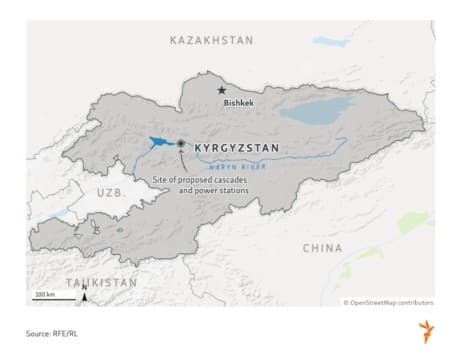Long-reliant on hydropower to keep its power grid up and running, Kyrgyzstan is grappling with nationwide electricity shortages so severe that the government declared a three-year energy emergency that took effect on August 1.
In seeking to build its power-generating capacity, Kyrgyz authorities also want to push forward with long-held plans for a series of new hydropower plants (HPP) along the Naryn River, with Bishkek signing a memorandum of understanding and an investment agreement with a consortium of Chinese companies on July 27.
Few details were revealed about the newly inked Kazarman project, which will consist of a cascade of multiple HPPs in succession in the country's Jalalabad Province, but according to an announcement by the Kyrgyz cabinet of ministers, it's tentatively estimated to cost between $2.4 billion-$3 billion, making it one of the country's most ambitious hydropower ventures.
"The investment agreement is the largest in the history of Kyrgyzstan. Under the control of the head of state, negotiations are under way on a dozen other projects of the same scale," Akylbek Japarov, the chairman of the Kyrgyz cabinet of ministers, said at the July 27 signing ceremony in Kyrgyzstan.
PowerChina Northwest Engineering Corporation, Green Gold Energy, and China Railway 20 Bureau Group Corporation are the Chinese companies in the HPP consortium and all have extensive experience on large-scale infrastructure projects inside China and globally.
While the companies have yet to comment on the Kazarman project, the China Railway 20 Bureau Group -- a subsidiary of the state-owned China Railway Construction Corporation, one of the world's largest construction companies -- has focused on Central Asia in recent years, mainly on clean-energy and power-generation projects.
In addition to the Kazarman plan, the company also signed a deal with Kyrgyzstan at the China-Central Asia summit in Xi'an in May to buy and invest in a solar-power project in Issyk-Kul -- one of the region's largest lakes -- in eastern Kyrgyzstan.
"Once operational, the annual electricity generation will account for about 17 percent of Kyrgyzstan's total electricity production," Song Rongjun, China Railway 20 Bureau Group's president for Asia and Oceania, told the state-run China Daily newspaper in June.
Searching For Energy Security
Together, the new projects could be a much-needed step forward to improve Kyrgyzstan's energy security.
Construction for the solar project at Issyk-Kul is set to start in 2024 and expected to be done in 2025. The Kazarman project, meanwhile, has a much longer timeline, with Kyrgyz officials saying they plan to break ground in 2024 and that it will be put into operation on the Naryn River by 2030. The Energy Ministry said a feasibility study will begin on September 1 and be completed in December 2024.
Kyrgyzstan already has some HPPs along the Naryn River and some plans to build others are decades old. Those plans have new momentum as policymakers are increasingly looking to harness the hydropower potential of the river, which flows westward and eventually joins with the Syr Darya, one of Central Asia's two main water arteries.

"In the coming years we will not only make up for our deficit in electricity production but will confidently reach levels that will allow us to earn hundreds of millions of dollars a year by exporting electricity," Japarov said while announcing the deal.
Studies over the years by entities like the United Nations, World Bank, International Monetary Fund, and Asian Development Bank have projected that proper development of the area could provide a major source of export revenue for Kyrgyzstan, which could then sell extra electricity to its neighbors in Central and South Asia as well as China.
But the large sums needed to finance such a venture -- combined with a history of poor government planning and financial scandals surrounding infrastructure deals -- have prevented large-scale projects like Kazarman from getting off the ground.
Since discussion about the Kazarman cascade of HPPs first began in 2013, several notable investors from multiple countries -- such as Turkey and Kazakhstan -- have been linked to it, as have several Chinese firms. But as seen by the current announcement with the Chinese consortium, Kyrgyzstan's eastern neighbor is increasingly willing to provide the financing needed for large-scale projects.
As former Energy Minister Doskul Bekmurzaev -- who was removed from office after an abuse-of-power scandal last year -- told Interfax in an August 2022 interview, Kyrgyzstan's long-term strategy is to increase its power-generation abilities in order to gain a surplus that can be sold next-door in the Chinese market.
He added that selling to China would provide diversity to protect against price fluctuations and help pay off the debts it has incurred in building the HPPs in Kyrgyzstan.
Lingering Questions
While the July deal on the Kazarman project is a major step forward for Kyrgyzstan as it grapples with energy shortages and rising demand, Myrzatai Sultanaliev, senior fellow at the Kyrgyz Research and Development Center of Energy, told RFE/RL's Kyrgyz Service that the project would be a big help toward staving off future energy crises.
But he notes there are still lingering questions about the July agreement. "We don't know under what conditions this agreement was reached," Sultanaliev said. "It's also not clear whether this was a full agreement or just a memorandum of intent to build. We've had cases like this before where investment agreements are signed but they remain only on paper and never reach the next stage."
Bishkek-based energy expert Batyrkul Baetov says there is little doubt the project would be a major contributor toward reversing the current energy emergency in the country, but he also harbors doubts about it coming to fruition. "Kyrgyzstan is dependent on foreign investors and foreign policy will play a large role in whether the contract is concluded properly and if the correct labor agreement is reached," he told RFE/RL.
Should Kyrgyzstan's ambitious hydropower strategy be realized it could also further accentuate Central Asia's tense water politics, which are forecast to get more fraught amid projections for increasingly arid weather due to climate change.
Land and resources play prominently in Kyrgyz politics. Most recently, the transfer of a water reservoir to Uzbekistan last year led to a crackdown on activists and media in Kyrgyzstan who opposed the deal.
With growing shortages of water and electricity that are expected to expand in the future, some experts have warned that upstream governments like Kyrgyzstan could be pushed to limit the flow to their downstream neighbors, likely sparking larger political standoffs in the process.
In the meantime, the country is still dealing with growing power shortages.
In 2022, Kyrgyzstan produced 13.85 billion kilowatt-hours (kWh) of electricity, but consumption reached 15.9 billion kWh, with imports making up for the shortage.
Consumption is expected to reach 17 billion kWh in 2023 and electricity production -- which is highly dependent on hydropower -- is only projected to hit 15 billion kWh due to lower-than-normal water flows into the Toktogul Reservoir, which is crucial for Kyrgyzstan's power generation needs.
By Toktosun Shambetov via RFE/RL
More Top Reads From Oilprice.com:
- UK Energy Giant Drax In Hot Water Over Alleged Misuse Of Profit Cap
- What Does China's Stimulus Plan Mean For Rare Earths?
- Colombia’s Economic Woes Worsen As Cocaine Prices Plunge


















